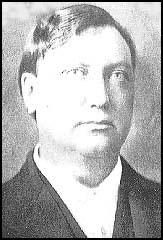Frank Steunenberg

Frank Steunenberg was born in Iowa in 1861. After leaving school at 16 he became a printer's apprentice and in 1881 found work with the Des Moines Register. He published his own newspaper in Knoxville before working for the Caldwell Tribune.
Steunenberg was active in the Democratic Party and in 1890 was elected to the state legislature and six years later became governor of Idaho.
In 1899 Idaho was hit by a series of industrial disputes. Steunenberg took a tough line and declared martial law and asked President William McKinley to send federal troops to help him in his fight with the trade union movement. Over a thousand trade unionists and their supporters were rounded up and kept in stockades without trial.
The unions felt betrayed as they had mainly supported his campaign to become governor. Activists were particularly angry about Steunenberg's attempts to justify his actions: "We have taken the monster by the throat and we are going to choke the life out of it. No halfway measures will be adopted. It is a plain case of the state or the union winning, and we do not propose that the state shall be defeated."
Steunenberg retired from office and on 30th December, 1905, he went out for a walk. On his return, when he pulled a wooden slide that opened the gate to his side door, it triggered a bomb, that killed him.
James McParland, from the Pinkerton Detective Agency, was called in to investigate the murder. McParland was convinced from the beginning that the leaders of the Western Federation of Miners had arranged the killing of Steunenberg. McParland arrested Harry Orchard, a stranger who had been staying at a local hotel. In his room they found dynamite and some wire.
McParland helped Orchard to write a confession that he had been a contract killer for the WFM, assuring him this would help him get a reduced sentence for the crime. In his statement, Orchard named William Hayward (general secretary of WFM) and Charles Moyer (president of WFM). He also claimed that a union member from Caldwell, George Pettibone, had also been involved in the plot. These three men were arrested and were charged with the murder of Steunenberg.
Charles Darrow, a man who specialized in defending trade union leaders, was employed to defend Hayward, Moyer and Pettibone. The trial took place in Boise, the state capital. It emerged that Harry Orchard already had a motive for killing Steunenberg, blaming the governor of Idaho, for destroying his chances of making a fortune from a business he had started in the mining industry.
During the three month trial, the prosecutor was unable to present any information against Hayward, Moyer and Pettibone except for the testimony of Orchard. William Hayward, Charles Moyer and George Pettibone were all acquitted.
